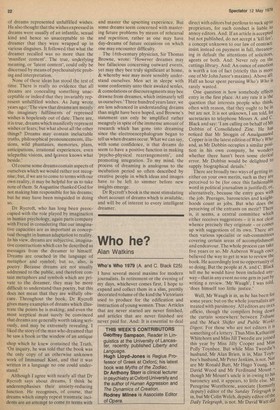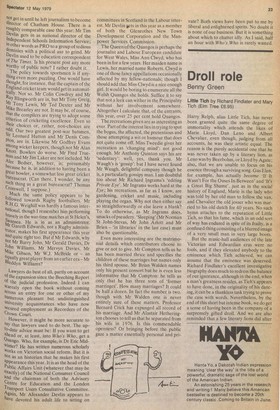Who he?
Alan Watkins
Who's Who 1979 (A. and C. Black E25) I have several moral maxims for modern journalists. In retirement or the evening of my days, whichever comes first, I hope to expand and collect them in a slim, prettily decorated volume of the kind the Victorians used to produce for the edification and instruction of young women. Thus: Articles that are never started are never finished, and articles that are never finished are never paid for. And: It is essential to deal direct with editors but perilous to suck up to proprietors, for such conduct is liable to annoy editors. And: If an article is accepted but not published, do not accept a 'kill fee', a concept unknown to our law of contract: insist instead on payment in full, threatening in default the attentions of solicitors, agents or both. And: Never rely on the cuttings library. And: An ounce of emotion is worth a ton of fact (strictly this is more one of Mr John Junor's maxims). Above all: Half an hour spent perusing Who's Who is rarely wasted. One question is how somebody effects entry in the first place. At any rate it is the question that interests people who think, often with reason, that they ought to be to but are not. It is not unknown, I am told, for secretaries to telephone Messrs A. and C. Black and say: 'I am calling on behalf of Mr Dobbin of Consolidated Zinc. He has noticed that Mr Snoggin of Amalgamated Copper is in the latest edition of Who's Who and, as Mr Dobbin occupies a similar position in his own company, he wonders whether there hasn't been some clerical error. Mr Dobbin would be delighted to supply biographical details.'
There are broadly two ways of getting in either on your own merits, such as they are perceived to be (for once this fashionable word in political journalism is justified), or, alternatively, because the entry goes with the job. Peerages, baronetcies and knighthoods count as jobs. But who does the perceiving of the entrants on merit? There is, it seems, a central committee which either receives suggestions — it is not clear whence precisely they originate — or comes up with suggestions of its own. There are then various specialist or sub-committees covering certain areas of accomplishment and endeavour. The whole process can take five years or so. Mr Auberon Waugh once believed the way to get in was to review the book. He accordingly lost no opportunity of so doing. But the people at A. and C. Black tell me he would have been included anyway— that in any event no one gets in just by writing a review. `Mr Waugh', I was told, 'does himself too little justice.'
Well, Mr Waugh is in, as he has been for some years: but on the whole journalists are treated with parsimony. All editors are in ex officio, though the compilers bring down the curtain somewhere between Tribune and the Muck Shifter and Public Works Digest. For those who are not editors it ls something of a lottery. Thus Miss Katharine Whitehorn and Miss Jill Tweedie are joined this year by Miss Jilly Cooper and Mlss Polly Toynbee. But while Miss Tweedie s husband, Mr Alan Brien, is in, Miss Toyn' bee's husband, Mr Peter Jenkins, is not. Nor are Mr Ronald Butt, Mr Hugo Young, Mr David Wood and Mr Ferdinand Mount :though Mr Mount's uncle is in owing to his baronetcy and, it appears, to little else. Mr Peregrine Worsthorne, associate (formell.Y deputy) editor of the Sunday Telegraph is in, but Mr Colin Welch, deputy editor of the Daily Telegraph, is not. Mr David Watt did not get in until he left journalism to become director of Chatham House. There is a toughly comparable case this year: Mr Tim Devlin gets in as national director of the Independent Schools Information Service; in other words as PRO to a group of tedious dominies with a political axe to grind. Mr Devlin used to be education correspondent of The Times. Is his present post any more worthy of public note? I rather doubt it. The policy towards sportsmen is if anything even more puzzling. One would have thought, for instance, that the captain of the England cricket team would get in automatically. Not so. Mr Cohn Cowdrey and Mr Ray Illingworth are in, but Mr Tony Greig, Mr Tony Lewis, Mr Ted Dexter and Mr Mike Brearley are not. It may be, of course, that the compilers are trying to adopt some criterion of cricketing excellence. Even so their choices or, rather, non-choices are on.;icl. Our two greatest post-war batsmen, Sir Leonard Hutton and Mr Denis CornPtun, are in. Likewise Mr Godfrey Evans among wicket keepers, though not Mr Alan Knott. Bowlers do worse. Mr Fred Trueman and Mr Jim Laker are not included. Mr Alec Bedser, however, is; presumably because he is, in addition to having been a great bowler, a somewhat less great cricket bureaucrat. (Can there, I wonder, be any such thing as a great bureaucrat? Thomas Cromwell, I suppose.) Much the same policy appears to be followed towards Rugby footballers. Mr 1(.H.G. We ighill was hardly a famous international, though I remember him performing bravely in the war-time matches at St Helen's, Swansea. He is in as an administrator. Mr Gareth Edwards, not a Rugby administrator, makes his first appearance this year and quite right too. But if Mr Edwards, why not Mr Barry John, Mr Gerald Davies, Dr Luhn Williams, Mr Mervyn Davies, Mr "like Gibson, Mr W.J. McBride or — an equally great player from an earlier era— Mr Bleddyn Williams?
Lawyers do best of all, partly on account of the expansion since the Beeching Report Of the judicial profession. Indeed I can scarcely open the book without coming across an entry for one or other of my numerous pleasant but undistinguished university acquaintances who have now secured employment as Recorders of the Crown Court.
However, it might be more accurate to say that lawyers used to do best. The upto-date advice must be: If you want to get ahead or, at least, into Who's Who, get a Quango. Who, for example, is Dr Eric Midwinter? He has written numerous scholarly Works on Victorian social reform. But it is not as an historian that he makes his first appearance this year. It is as the head of the Public Affairs Unit (whatever that may be exactly) of the National Consumer Council and the chairman of both the Advisory Centre for Education and the London Transport Users Consultative Committee. Again, Mr Alexander Devlin appears to have devoted his adult life to sitting on committees in Scotland in the Labour interest. Mr Devlin !lets in this year as a member of both the Glenrothes New Town Development Corporation and the Manpower Services Commission.
The Queen of the Quangos is perhaps the journalist and Labour European candidate for West Wales, Miss Ann Clwyd, who has been in for a few years. Her maiden name is Lewis, her married name Roberts. Clwyd is one of those fancy appellations occasionally affected by my fellow-nationals; though I should add that Miss Clwyd is a nice enough girl. It would be boring to enumerate all the Welsh Quangos she holds. Suffice it to say that not a leek can wither in the Principality without her involvement somewhere. Altogether I calculate that, of the entrants, this year, over 25 per cent hold Quangos.
The recreations given are as interesting as ever. Part of the interest lies in trying to spot the bogus, the affected, the pretentious and those attempting a wit or humour that does not quite come off. Miss Tweedie gives her recreation as 'changing mind': not good enough. Mr Anthony Quinton says his are 'sedentary': well, yes, thank you. Mr Waugh's is 'gossip': but I have never found Mr Waugh, delightful company though he is, a particularly gossipy man. I am doubtful too about Mr Richard Ingrams's 'editing Private Eye'. Mr Ingrams works hard at the Eye; his recreations, as far as I know, are gardening, cricket and music, including playing the organ. Why not then either say so straightforwardly or else leave a blank? To do otherwise, as Mr Ingrams does, smacks of pseudery. 'Sleeping' (Mr Norman St John-Stevas, Mr John Arlott and Mr Brien — 'in libraries' in the last case) must also be questionable.
Even more interesting are the matrimonial details which contributors choose to give or not to give. Mr Compton tells us he has been married thrice and specifies the children of these marriages but names only his third spouse. Mr Brian Walden names only his present consort but he is even less informative that Mr Compton: he tells us only that he has three sons of 'former marriages'. How many marriages? It could be half a dozen. In fact the number is two.
though with Mr Walden one is never entirely sure of these matters. Professor Bernard Crick has expunged all record of his marriage. And Mr Alastair Hethering ton chooses to tell us that he separated from his wife in 1976. Is this commendable openness? Or bringing before the public gaze a matter essentially personal and pri vate? Both views have been put to me by liberal and enlightened spirits. No doubt it is none of our business. But it is something about which to chatter idly. As I said, half an hour with Who's Who is rarely wasted.



































 Previous page
Previous page